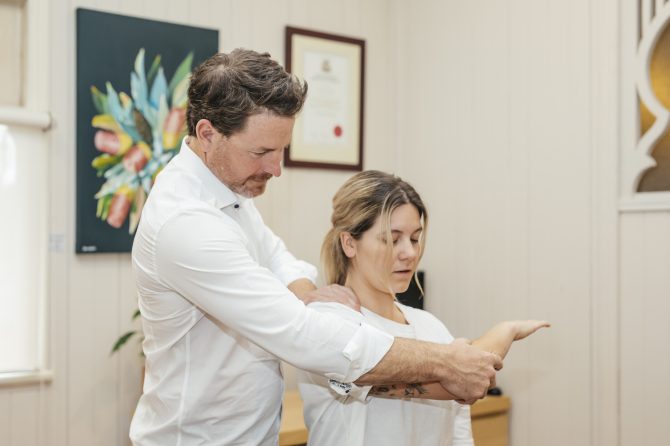FROZEN SHOULDER
Frozen shoulder, also known as adhesive capsulitis, is a condition characterized by stiffness,
pain and limited range of motion in the shoulder joint. It typically develops gradually over
time and can be quite debilitating. The exact cause of frozen shoulder is not always clear,
but it often occurs following periods of immobilization, injury, surgery or conditions such as
diabetes or thyroid disorders.
There are typically 3 stages in this condition:
- Inflammatory phase (Freezing): Very painful to move and gradually tightening. This
can last for up to a couple of months. - Adhesive phase (Frozen): Usually less pain but very stiff/immobile. This can typically
last for up to 6 months. - Recovery phase (Thawing): gradual return of function and mobility. This timeframe
has a large variability of 6 months to 2 years.
Chiropractic care can be beneficial in the management and recovery of frozen shoulder. The
type of treatment and advice provided will depend on the stage of its progression. The aim
is pain relief and lessening the immobility, then maximising the speed and quality of
recovery:
- Joint manipulation/mobilization: Chiropractors are trained in joint manipulation
techniques that can help improve the mobility of the shoulder joint. By applying
gentle pressure or thrusts to specific areas of the shoulder, they can help restore
proper joint function and alleviate stiffness - Soft tissue techniques: chiropractors may use soft tissue techniques such as massage
therapy, myofascial release, or trigger point therapy to address tightness and tension
in the muscles and connective tissues surrounding the shoulder joint. This can help
reduce pain and improve flexibility. - Exercises: chiropractors can prescribe specific exercises and stretches to help
strengthen the muscles around the shoulder joint and improve range of motion.
These exercises are often tailored to the individual needs of the patient and advised
to do at home. - Posture correction: poor posture can contribute to shoulder dysfunction and
exacerbate symptoms of frozen shoulder. Chiropractors can provide guidance on
proper posture and ergonomic adjustments to alleviate stress on the shoulder joint
and promote healing.
If you are looking for help to treat frozen shoulder, please give us a call at Yeronga
Chiropractic 3892 1440 or book online at www.yerongachiropractic.com.au

